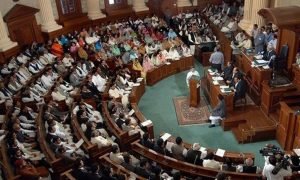ISLAMABAD: Polling process for the General Elections 2018 that started at 8 in the morning has concluded at 6 PM today all over Pakistan.
At the closing time, long queues were observed in and outside the polling stations. However, only those who were inside the premises of the polling stations were allowed to cast their votes.
RAWALPINDI: The eleventh general election was Wednesday held in Rawalpindi division amidst foolproof security arrangements ensuring the conduct of polls in free, fair and transparent manner while over 14,841 police personnel were deployed on duty across the division.
The overall polling process in the division remained peaceful as a few incidents of physical brawl and skirmishes besides exchanges of hot words at few places were reported. This time the voters turn out as compared to the previous general election was considerably high as the youth including men and women showed enthusiasm to support their respective candidates as well as the political parties. According to the experts, the overall voter turnout is estimated to be around 50 % despite extreme humid weather conditions. Generally, people were appreciative of the arrangements made by ECP to facilitate the voters at the polling stations. The people exercised their right to franchise electing 12 National Assembly and 27 Provincial Assembly members in the division.
Over 14,841 police personnel were deployed on duty across the Division of which 8,388 cops performed security duty in Rawalpindi district while 2,754 in Attock district. Similarly, 1,841 police officials were on security duty in Jhelum and nearly 2,141 in Chakwal district. Total registered voters of the division are 71,50,800 registered votersChief Election Commissioner Justice (r) Sardar Muhammad Raza Khan also visited three polling stations set up in NA-62 to observe the polling process and expressed satisfaction over arrangement made to ensure free, fair and transparent election. He visited Divisional Public School, Dhoke Kala Khan, Shamsabad, Pir Mehar Ali Shah-Arid Agricultural University Rawalpindi (PMAS-AAUR), Murree Road and Government Degree College for Women, Sixth Road, Satellite Town.
Strict monitoring of the polling stations especially inclusive of those falling in categories “A” and “B” was carried out through Close Circuit Television (CCTV) cameras. Meanwhile, district monitoring officers were monitoring the steps taken for strict compliance with the code of conduct issued by ECP. ECP had appointed 12 Returning Officers (ROs) and 24 Assistant Returning Officers (AROs) for 12 constituencies of NA and 27 constituencies of PA of Punjab in the Division. The ROs and AROs appointed for NA-55 to NA-67 including two constituencies of Attock, six of Rawalpindi, two of Chakwal and two constituencies of Jhelum. Similarly, five provincial assembly constituencies from PP-1 to PP-5 in Attock district, 15 constituencies of PP-6 to PP-20 in Rawalpindi district, four constituencies PP-21 to PP-24 in Chakwal district and three Jhelum constituencies from PP-25 to PP-27 were included.
The ECP had postponed the election in NA-60 due to conviction/disqualification of a candidate, Hanif Abbasi. A sizable number of contingents of Law Enforcement Agencies inclusive of Army besides police and Reserve police were deployed in and around 5,328 polling stations in the four districts of Rawalpindi division including Rawalpindi, Attock, Jhelum, and Chakwal. The civil administration on the directive of caretaker Chief Minister Punjab Dr Hasan Askari clamped tight security arrangements for A, B and C categories polling stations (PSs) in Rawalpindi Division where 606 Polling Stations set up for election were declared highly sensitive (A) and 1036 sensitive (B) in the Division including Attock, Rawalpindi, Chakwal, Jhelum and Islamabad. The category “C” was for such polling stations which could be termed as “Normal”. Polling started at 08:00 am continued up to 06:00 pm without any break.
Talking to APP, District Election Commissioner Rawalpindi-I, Malik Saleem Akhtar said, District Election Commission finalized best possible arrangements for the general election 2018. According to the ECP sources, the basic facilities including electricity, drinking water, toilets for the polling staff and voters at all polling stations were ensured in Rawalpindi division. 6,200 polling booths including 3,200 for male and 3,000 for female voters were set up in Rawalpindi district. Total 2,576 Polling Stations were set up in the district to facilitate the voters who cast their ballot to elect representatives of their choice. The National Database and Registration Authority (NADRA) had activated the Result Transmission Service (RTS) to enable Returning Officers to send results to the ECP through the service.
NADRA teams visited the offices of Returning Officers to activate RTS and according to the ECP, the presiding and assistant presiding officers were given the software to use through smartphones. The presiding officers who did not have smartphones, the software linked to the smartphones of their respective subordinate staff which was being used to pass on the results of respective constituency after compilation. The election commission had constituted a control room in every constituency of the district where one returning officer (RO) remained present all the time to monitor the elections and polling activities through cameras installed in the polling stations. In the Rawalpindi District, 104 polling stations were declared as highly sensitive while 91 others were termed as sensitive. As many as 67 candidates were competing for six NA seats while 166 candidates were vying for the provincial assembly seats.
There were six heavyweight candidates in the run including former prime minister Shahid Khaqan Abbasi, former premier Raja Pervaiz Ashraf, former interior minister Chaudhary Nisar Ali Khan, former federal minister Ghulam Sarwar Khan, Awami Muslim League (AML) Chairman Sheikh Rashid Ahmed and Raja Qamaul Islam. According to City Police Officer (CPO) Abbas Ahsan, the police took all possible measures to maintain law and order on the polling day. The CPO informed that the ban on display of weapons is being implemented in letter and spirit and no one is being allowed to violate the ban. He said that the polling stations in Rawalpindi were categorized as A, B and C for security purposes. As part of security arrangements, the CPO said that the district had been divided into sectors and sub-sectors. Meanwhile, polling stations were divided into sub-sectors of 20 police stations, with each sub-sector assigned two police personnel on a motorbike and a patrol van with six police personnel.
According to ECP sources, NA-59, Rawalpindi-III, was the most sensitive constituency in Rawalpindi district having 31 highly sensitive and seven sensitive Polling Stations (PSs). Meanwhile, the security plan for the polling stations falling under the administrative control of Islamabad capital territory was finalized by the Islamabad administration separately. According to the administrative division by the ECP, Islamabad was part of the Rawalpindi region. Out of 786 polling stations of the federal capital, 26 were declared highly sensitive, 87 sensitive and 673 normal in the federal capital. 1,069 polling stations of Attock district include 301 highly sensitive, 532 sensitive while 236 were normal. Rawalpindi district had 2,576 total polling stations including 145 highly sensitive, 99 sensitive and 2332 normal while Chakwal district had a total of 925 polling stations with 74 highly sensitive, 217 sensitive and 634 normal.
Similarly, Jhelum had 60 highly sensitive, 101 sensitive and 597 normal in total 758 polling stations of the district. City Traffic Police (CTP) had also finalized a comprehensive traffic plan to regulate traffic on important roads of the city on the Election Day. Enhanced number of traffic wardens were deployed in the city particularly congested areas of the town while traffic diversions were available at several points to facilitate the road users Punjab Emergency Service, Rescue-1122 Rawalpindi had also finalized emergency arrangements for Election Day while over 500 rescuers remained on high alert. The staff was deployed on special duties in district control room and emergency rescue stations with 46 fully equipped emergency ambulances, 45 motorbike ambulances, 17 fire vehicles, eight rescue and recovery vehicles, two specialized vehicles, and three water bowsers.
KPK: The votes polling process was peacefully concluded in Khyber Pakhtunkhwa including seven tribal districts on Wednesday with no untoward incident reported except Swabi incident. Polling of votes continued in all 26 districts of KP and seven tribal districts recently merged in Khyber Pakhtunkhwa uninterrupted till 6 pm and voters inside polling stations were allowed to cast votes.
Soon after completion of the polling process, counting of ballot papers continued in presence of political agents of contesting candidates. Senior citizens, disabled persons, youth, and women voters besides registered male and females voters in hundreds of thousands polled their votes during the last three hours of the polling process.
KP has witnessed healthy voters turn out in 2018 general election in comparison with 2013 elections and turned out of women were comparatively higher in this election than last general elections.
In Peshawar, great turned out is expected in city polling stations including Gul Bahar, Hashtnagri, Dalazak Road, Tarnab, Tehkal, Qisakwani, Ganj, Kohati, Ramadas, Chamkani, Faqirabad, Latifabad, Shami Road, Hayatabad, University Town, Warsak Road, Badagbar, Surizai, Pandu, Nasirbagh and University Town.
After Zuhar prayers, hundreds of thousands of voters thronged to these polling stations and polled their votes in favor of their chosen candidates. The women also polled votes at different polling stations in Dir Upper and Lower Districts.
Chief Secretary Khyber Pakhtunkhwa Naveed Kamran Baloch visited Election Coordination Cell at Home Department and reviewed the security arrangements made for elections. Meanwhile, the Chief Secretary and KP IGP Muhammad Tahir visited the Command and Control Room at Capital City Police Station where they were briefed by SSP Operation Javed Iqbal Wazir about the working of the control room.
All the polling stations were monitored from the control room. Security forces’ personnel and police were deployed at all polling stations in KP that immensely helped the voters in casting their votes in a safe and secure environment.
BALOCHISTAN: Polling for 2018 electoral polls to elect 16 National Assembly and 50 Provincial Assembly seats concluded. The polling started at 8 am and continued till 6 pm without any break. LEAs were present polling stations in all the districts, where citizens exercised their right to vote.





